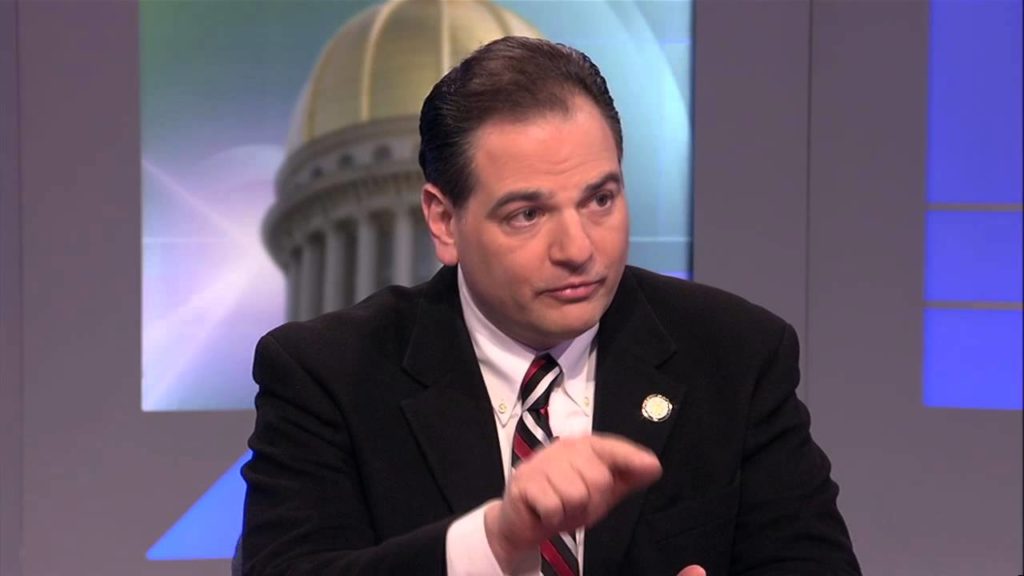Scutari Presents Legislation to Legalize Recreational Marijuana in NJ

Senate Judiciary Chairman Nick Scutari (D-22) announced that he will introduce new legislation today to legalize the possession and personal use of small amounts of marijuana in New Jersey for those who are age 21 and older.
Scutari told InsiderNJ that in an effort to make the bill more palatable to some of his legislative colleagues, he excised the homegrown provision and included an oversight committee.
Eight states have legalized recreational marijuana and public support for the effort is at an all-time high, with 60 percent of people in the United States favoring legal recreational marijuana, according to the Senate Majority Office. The bill builds on the successes of other states and incorporates the lessons learned from their experiences, including from Colorado, where Scutari last year led a bipartisan legislative delegation to examine the state’s marijuana industry.
“The drug laws in this country prohibiting the use and possession of marijuana have failed. It is time to end the detrimental effect these archaic laws are having on our residents and our state,” said Scutari, who authored the law creating New Jersey’s medical marijuana program. “Across the country, states have successfully implemented recreational marijuana laws and it’s time that we begin shaping our own program in New Jersey. This bill will create a strictly regulated system that permits adults to purchase limited amounts of marijuana for personal use. It will bring marijuana out of the underground market where it can be controlled, regulated and taxed, just as alcohol has been for decades.”
Scutari said legalizing, regulating and taxing marijuana for those who are age 21 and older could generate millions of dollars in tax revenue that can by dedicated to any number of worthy programs, such as substance abuse treatment and prevention efforts, transportation and women’s health. Colorado reported a record $1.3 billion in medical and retail sales of marijuana in 2016, the third year of its program, and an estimated $200 million in taxes. That figure does not include the broader economic impact of the business in the state. The industry also created thousands of jobs in sales, production and related services, which would be duplicated in New Jersey.
In addition, the legalization of marijuana would free up millions of dollars spent each year on enforcement of the state’s marijuana laws, and it would end discriminatory enforcement. New Jersey spends $127 million a year on enforcement, according to a report by the American Civil Liberties Union. The report also found African-Americans are 2.8 times more likely in New Jersey to be arrested for marijuana possession than a Caucasian person, even though the rate of marijuana use is similar. Legalization would eliminate the detrimental effect that a marijuana arrest can have on residents’ lives. It would also strike a blow to criminal enterprises that profit from the illegal market, getting drug dealers off New Jersey’s streets.
The Senator’s bill would:
· Create a recreational marijuana program in New Jersey that would provide for the licensure of marijuana cultivation, manufacturing, wholesale and retail facilities. The legislation would permit the possession of up to one ounce of marijuana, 16 ounces of marijuana infused product in solid form, 72 ounces in liquid form, and 7 grams of concentrate; it would prohibit growing marijuana plants at home and consumption of marijuana openly or in a public place.
· Establish the Division of Marijuana Enforcement in the Department of Law and Public Safety that would be charged with regulating the state’s recreational marijuana program under a strict regulatory scheme laid out in the legislation, setting rigorous requirements for every aspect of the program. The regulations would include security requirements for establishments, licensee and employee background checks and screening, a seed-to-sale tracking system, dosage, potency and serving size limits, strict labeling requirements, marketing restrictions and mandatory childproofing of all products.
· Require the division to establish licensing goals for New Jersey residents and minority- and women-owned businesses, and to adopt regulations to implement the program and to begin accepting applications for licenses for marijuana establishments within one year of the bill’s enactment. Upon enactment of the bill, existing medical marijuana establishments could apply for a retail license to operate immediately under the recreational program.
· Give municipalities flexibility to enact local measures governing the operation of marijuana establishments, or prohibiting their operation. The bill would also permit municipalities to issue licenses in local jurisdictions if the division failed to do so 90 days after the one-year timeframe allotted for the division to begin processing applications.
· Establish an escalating sales tax rate on the following schedule, with the aim of encouraging early participation and development of marijuana establishments and to undermine the illegal market: 7 percent in the first year; 10 percent in the second; 15 percent in the third; 20 percent in the fourth; and 25 percent in the fifth year. It would repeal the sales tax on medical marijuana.
· Decriminalize the possession of up to 50 grams of marijuana upon enactment but before implementation, limiting fines to $100, and permit expungement of certain marijuana charges.
“The prohibition of marijuana has been problematic on so many levels. New Jersey cannot afford to sacrifice its public safety and residents’ civil rights by continuing its ineffective and wasteful marijuana enforcement policies,” said Scutari. “Other states’ programs are working well, creating jobs and generating tax revenue, and have not seen the doom-and-gloom scenarios once predicted. Regulating the sale and consumption of marijuana in New Jersey will not only benefit the state financially, but will mean a safer and more responsible way of treating this drug and a more humane way of treating our residents.”








Leave a Reply